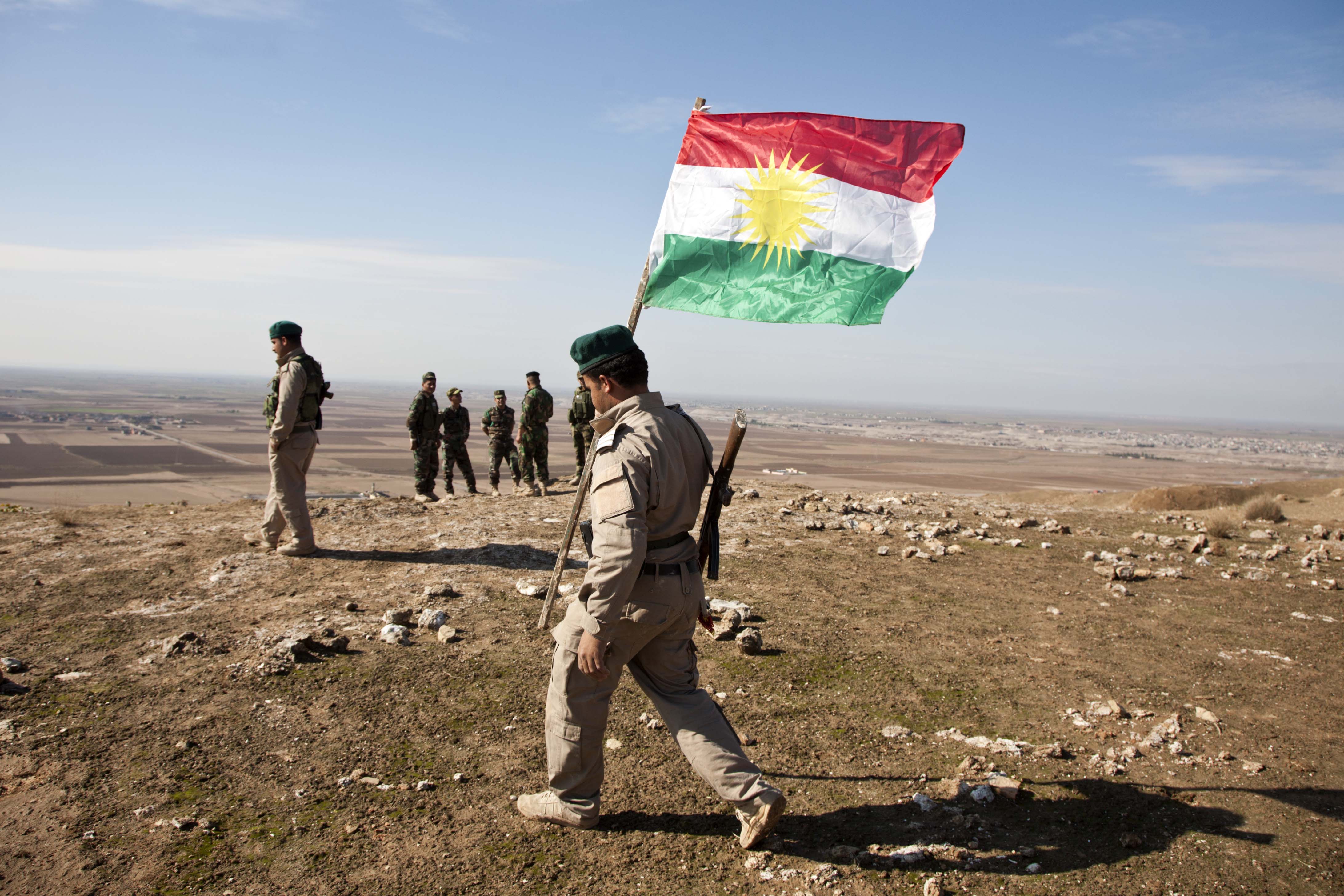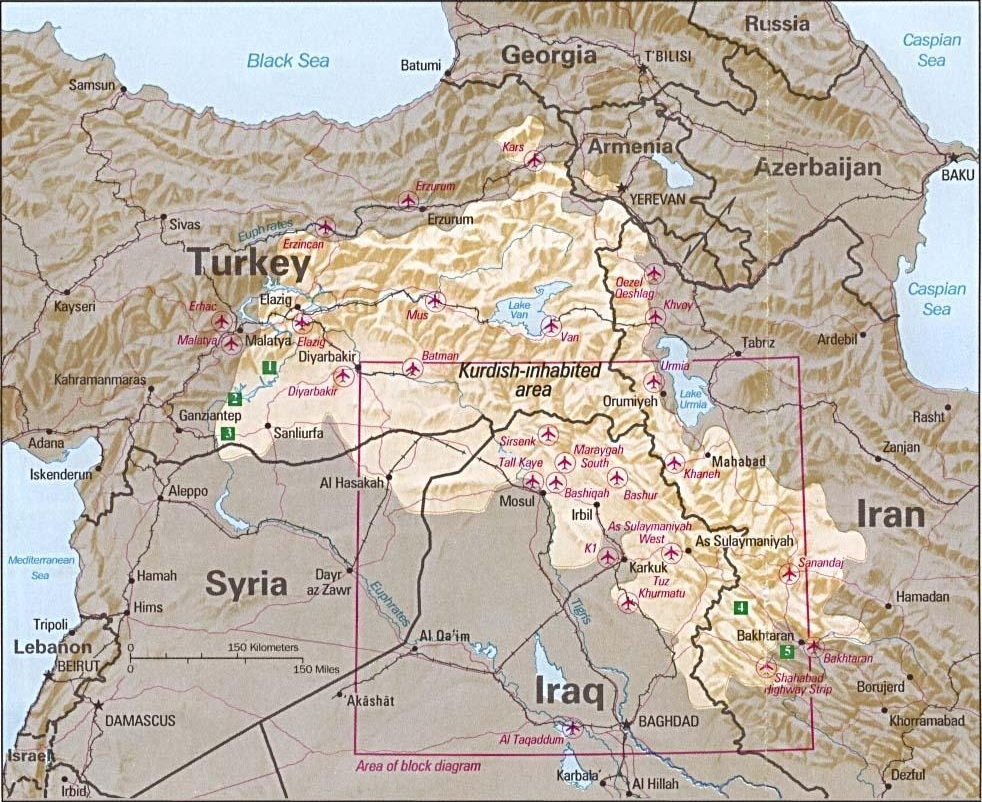How Obama can one-up Putin in the Syria crisis: Support an independent Kurdistan
Maybe it's time to carve a united Kurdish homeland out of Syria and Iraq, for America's sake


A free daily email with the biggest news stories of the day – and the best features from TheWeek.com
You are now subscribed
Your newsletter sign-up was successful
Once again, the Kurds may be the odd man out.
The largest ethnic group in the world without a country of their own, the Kurds have been the West's most effective ally battling the Islamic State on the ground in Iraq and Syria. They've repelled ISIS from the borders of their semi-autonomous region in Iraq, and they've defeated them in key Turkish border towns, including the much-celebrated battle of Kobani.
Still, despite the Kurds' successes, their situation is looking familiarly grim.
The Week
Escape your echo chamber. Get the facts behind the news, plus analysis from multiple perspectives.

Sign up for The Week's Free Newsletters
From our morning news briefing to a weekly Good News Newsletter, get the best of The Week delivered directly to your inbox.
From our morning news briefing to a weekly Good News Newsletter, get the best of The Week delivered directly to your inbox.
Russia and Iran have been beefing up their military presences in Syria to help prop up their joint ally, President Bashar al-Assad. On Wednesday, hours after Russian President Vladimir Putin obtained formal authorization to deploy forces in Syria, purportedly to battle ISIS, Russian fighter jets instead reportedly bombed rebels trying to unseat Assad.
Putin has given a perfunctory nod to the Kurdish successes. But the Kurds have good reason for concern. Once Assad's position is strengthened, why wouldn't Putin turn against the Syrian Kurds, too? They are, after all, a growing threat to Assad's rule.
And if Putin did attack the Kurds, he might not even hear objections from many of Assad's regional foes.
Turkey, a strong U.S. ally and strident Assad opponent, has a long and often hostile history with the Kurds, and it has been actively thwarting them in Syria. As soon as it joined the fight against ISIS, Turkey immediately started bombing the Kurdish Workers' Party (PKK), a close ally of the Syrian Kurds, in Turkey and Iraq.
A free daily email with the biggest news stories of the day – and the best features from TheWeek.com
Turkey recently started allowing the U.S. use one of its air bases to attack ISIS, and as The New York Times noted in August, "Syrian Kurds are now starting to worry that their success might not outweigh Turkey’s importance to the United States."
Devoid of a reliable ally in the region, the Kurds shouldn't have to worry about America's commitment.
President Obama's strategy of degrading and slowly destroying ISIS is looking increasingly untenable now that Russia has both feet in the conflict. If Obama wants to get ahead of ominous developments in Syria for once, he should consider throwing U.S. support behind an independent Kurdistan, one that is carved out from the decaying husks of Syria and Iraq.
If Russia's realpolitik objective in Syria is simple to grasp — support Assad, destroy his enemies — the U.S. effort has been hampered by the fact it actively opposes the two main actors in the Syrian war: ISIS and Assad. America isn't really fighting for anything. A newly forged Kurdish state would change that, to the benefit of the U.S. and the Kurds.
It would also be the culmination of a long-held dream: Sheikh Mahmud Barzinji declared himself king of Kurdistan in 1922, two years after the French and British promised the Kurds their own homeland in the Treaty of Sevres and a year before the Treaty of Lausanne "dealt a definitive blow to Kurdish aspirations for self-determination in the aftermath of the Ottoman Empire's disintegration," as Tanya Goudsouzian notes at Al Jazeera.
The result of the British and French boundary-drawing exercise was the modern states of Syria and Iraq, and about 100 more years of harassment, abuse, and quashed attempts for autonomy for the Kurds. Today, there are about 30 million Kurds, spread between northeastern Syria, Turkey, Iran, and Iraq.

[CIA, 1992]
There are moral, strategic, and practical reasons for the U.S. to drop its insistence on keeping Iraq and Syria's borders intact and put its considerable heft behind a united Kurdistan.
Let's start with the practical. And that begins with accepting reality.
"Syria as we've known it since it was formed 100 years ago — it's finished, I think," Andrew Tabler, a Syria expert at the Washington Institute for Near East Policy, tells The Associated Press. "What the international community will have to recognize is de facto partition, and work with different parties to try and stabilize those areas."
The Kurds already control a broad swath of Syria and greatly expanded their land and oil holdings in Iraq after the Iraqi army collapsed in Mosul in 2014, notes Middle East politics expert Gareth Stansfield in a Brookings Institution report. By ignoring the fact that the Iraqi Kurds already have a de facto state, complete with the beginnings of an autonomous oil-based economy, he writes, "the United States risks losing the strongest and most natural ally it has ever had in Iraq," or even "antagonizing what could be a key ally in an increasingly unpredictable Middle East."
While the Kurdish regional government in Iraq has been moving toward independence, the Kurds of northeastern Syria have been creating their own laws and state apparatus. The U.S. has already been coordinating its air campaign against ISIS with the Kurdish People's Protection Units (YPG), famous for vanquishing ISIS in Kobani and Tal Abyad (with help from the Free Syrian Army and Assyrian Christian forces).
Strategically for the U.S., an independent Kurdistan would provide a base of operations in a country that has invited its help — bombing ISIS inside Syria against the wishes of Assad, its internationally recognized leader, is legally problematic. It would also ensure the survival of the best troops in the fight against ISIS. The Obama administration doesn't want to commit ground forces to the ISIS battle — neither does the American public — and the YPG and Iraqi Kurdish peshmerga fighters have really been the only effective military counterweight to ISIS.
Helping carve out an independent Kurdistan isn't without its risks and problems, of course. First of all, there are "international legal niceties that the U.S. government would be acting against, including the principle of the territorial integrity of states and the inviolability of existing state borders," notes Brooking's Stansfield, though he rightly adds that the rise of ISIS and bloody civil war in Syria have sort of thrown the state border problem out the window. Iraq and Syria, frankly, are too weak to do much about it.
Then there's the fact that the 30 million Kurds in the area don't all speak the same language, have the same culture, or even like each other all the time.
But the biggest obstacle is getting the rest of the world to go along, especially the prospective Republic of Kurdistan's two most powerful neighbors, Turkey and Iran. Turkey is a member of NATO and a key U.S. ally, so let's start there.
Turkey is probably the main reason for American hesitance, and the big question is not if but how strongly Turkey would oppose sharing its border with an independent Kurdistan. There are reasons to think, however, that it could be convinced to curtail its objections.
Turkey has been stuck in a long, recently reactivated conflict with the PKK, which Turkey, the U.S., and Europe have all designated as a terrorist organization for its well-armed militant wing. The PKK is aligned with the Democratic Union Party (PYD), the party that controls Syria's Kurdish enclave. Ankara worries, with some justification, that the PKK would take the creation of an independent Kurdistan next door as impetus to resurrect its discarded call for its own independent state in southern Turkey.
But Stansfield calls those concerns overblown, suggesting that Turkey might even welcome a Kurdish buffer between it and the Sunni Arab insurgents fighting in Syria and Iraq, and Shiite Iran's meddling in Iraq. Iraqi Kurds have even started selling much-needed oil to Turkey, he notes, staking out a "strong case" that Ankara "would at least tacitly, maybe even actively, support" an independent Kurdistan. "For Turkey, irrespective of past antipathy toward an independent Kurdistan, the possibility of a Republic of Kurdistan now being their pliant neighbor to the south-east has its distinct attractions."
Iran would be worried about its own sometimes restive Kurdish population, as well as its other minority groups, but Tehran also wants to extends its influence over Iraq and Syria, and a smaller Iraq with less oil would go against its self interest. There's not much the U.S. could do about that, and Iran is disinclined to listen to the U.S., anyway.
If Turkey doesn't strongly oppose a neighboring Kurdistan, though, that makes it a much easier sell for its other NATO allies. If the new country also promised to welcome refugees from elsewhere in Syria, giving them equal rights in a secular republic, it's hard to imagine Europe not backing the effort. Israel, a longtime ally of the Kurds, has already called for an independent Kurdistan, with Prime Minister Benjamin Netanyahu explicitly supporting the idea in June 2014.
If all else fails, there's the moral case. For more than a century, the West has held out the promise of an independent Kurdistan like Lucy holds out the football for Charlie Brown. When Britain or France of the U.S. pulls back the football at the last minute, as the U.S. is widely believed to have done in 1991, the Kurds usually get hurt in large numbers.
There are separatist movements all over the world, and most of them don't end in their own nation. The Kurds may be a special, especially numerous case, and the stars seem to have (somewhat tragically) aligned to make a sovereign Kurdistan a reality — whether or not the U.S. gets on board.
If the U.S. wants a rare moment of positive feeling about its mideast policy, Kurdistan would check a lot of boxes. If Hollywood isn't already working on a movie about outnumbered Kurdish fighters, men and women, bravely fighting alongside endangered Christian allies against the brutal tyrants of ISIS, somebody in California is doing something wrong. That's not reason enough for the U.S. to do something right for the Kurds, but it sure beats Putin's story.
Peter has worked as a news and culture writer and editor at The Week since the site's launch in 2008. He covers politics, world affairs, religion and cultural currents. His journalism career began as a copy editor at a financial newswire and has included editorial positions at The New York Times Magazine, Facts on File, and Oregon State University.
-
 The ‘ravenous’ demand for Cornish minerals
The ‘ravenous’ demand for Cornish mineralsUnder the Radar Growing need for critical minerals to power tech has intensified ‘appetite’ for lithium, which could be a ‘huge boon’ for local economy
-
 Why are election experts taking Trump’s midterm threats seriously?
Why are election experts taking Trump’s midterm threats seriously?IN THE SPOTLIGHT As the president muses about polling place deployments and a centralized electoral system aimed at one-party control, lawmakers are taking this administration at its word
-
 ‘Restaurateurs have become millionaires’
‘Restaurateurs have become millionaires’Instant Opinion Opinion, comment and editorials of the day
